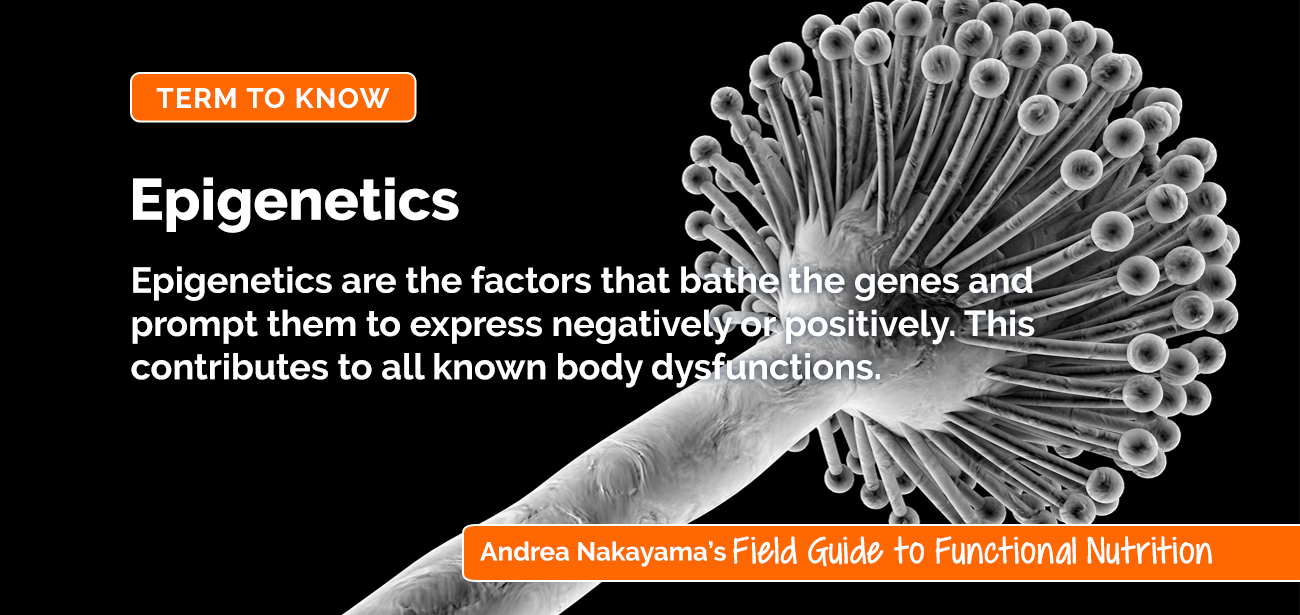Epigenetics: The Impact of Environment on Gene Expression
Posted by Andrea Nakayama

Listen to this post instead!
Let’s talk epigenetics.
Genes and environment
Epi- is a prefix taken from Greek that means “upon, at, by, near, over, on top of, toward, against, among.”
Epigenetics are the factors that bathe our genes and prompt them to express negatively or positively, turning them “on” or “off”, up or down. This expression contributes to all known dysfunctions.
We’ve all got genes. We know that. And by now many of us also know that the genes we have don’t dictate our health or lack thereof. Most of us are familiar with the saying “genes load the gun, but the environment pulls the trigger”.
And while this common metaphor makes the relationship between the genome and epigenome clear, I recognize that it’s also not one that many of us in the health and healing professions feel comfortable using. That’s why I prefer the analogy of the butterfly effect.
What is the Butterfly Effect of Epigenetics?
The butterfly effect states that there is a sensitive interdependence on conditions in which a small change in one system can result in large differences in other systems. We can think of the epigenome (or the environment) as the system that results in changes in the genome.
In other words… all things matter.
Everything is connected.
We are all unique.
All things matter.
The impact of epigenetics on health
Again, epigenetics are that environment. And the environment is how we influence the genetic and cellular expressions that manifest as signs, symptoms and disease states. We shift the environment by modifying factors like diet, lifestyle, outlook, and biological function (or how the body performs its many jobs).
These habit changes that each and every patient can make—especially with the help of a knowledgeable Functional Nutrition Counselor—result in clinical remedies. When we develop Epigenetic Mastery we have the skills to guide our clients in ways that enable all controllable health factors to be addressed.
And when you help your clients take charge of their internal and external environments, you catapult their health, and your success.
Everyone has different epigenetic factors
Let’s take a quick lesson from twins to drive the concept of epigenetics home…
Identical twins are said to be genetic carbon copies of one another. And yet, over time, these identical twins shift and change so that their physical expression often becomes distinct. In other words, we can more easily tell one from the other.
While it’s the genes that provide the instructions for the development of the body, it’s the epigenome that interacts with the DNA to provide what might be considered a second set of instructions.
This second set of instructions works to turn on or turn off particular genes by tagging them, thereby influencing the expression, but not the genetic code itself.
Twins start out with not just the same genes, but the same imprinted epigenome (the tags that come with us at birth, that are handed down from our parents—something otherwise known as “antecedents” in Functional Medicine). Yet from the moment and experience of birth, and onward as aging occurs, the environment of the twins will begin to differ—different relationships, different food choices, different sleep patterns, different exposures to viruses, etc. These differences will influence their epigenome—or environment—and therefore their genetic expression and physical manifestation.
Epigenetic factors that influence genetic expression
Here’s a quick list of factors that you can consider that impact genetic expression:
- diet
- nutrient status
- hydration
- toxic exposures
- stressors
- relationships
- community/support
- sleep
- relaxation
- exercise
- mindset
- and more
When you find yourself lost, trying to be a genetic genie, remember that you likely have more of an opportunity to influence genetic expression by backing up and considering the epigenome.
Learn More about Epigenetics and Become a Functional Nutrition Counselor!
Understanding the complex issues that your clients face is not as simple as looking on the surface. It takes a deep dive into someone’s lifestyle, habits and environment to properly assess health. The counselors trained by Functional Nutrition Alliance know how to find the why’s of their client’s ailment. By completing coursework with Functional Nutrition Alliance, you can solve complex health cases. Get results. Be the expert for your clients. Become a Functional Nutrition Counselor!
EXPERIENCE A FREE TRAINING SERIES WITH ANDREA NAKAYAMA TO HELP YOU
Begin practicing functionally today!
MORE TO EXPLORE
You Might Also Like
Maya Simand: Cancer Survivor to Holistic Cancer Coach
Holistic cancer coach Maya Simand shares her inspiring journey to healing. Discover how Functional Nutrition education empowered her to overcome breast cancer and help others find hope through integrative approaches.
Read MoreEstrogen dominance and breast cancer prevention: A Functional Nutrition approach
Estrogen dominance is a key factor in ER+ breast cancer. This Functional Nutrition guide explores how estrogen dominance increases risk and provides practical strategies to balance hormones and support overall health.
Read MoreThe 3 Roots, Many Branches: A Functional Framework for Clinical Success
As practitioners or aspiring nutrition counselors, we’re all familiar with the frustration of watching people struggle with chronic illness, cycling through symptoms and diagnoses without resolution.
Read MorePutting Patients First with Patient-Centered Care
I recently read an account written by a primary care doctor (PCP) describing a patient who had been passed from one specialist to another—each one focusing on ordering tests, prescribing medications, and ultimately sending her off with more questions than answers. No one paused to truly listen to the patient’s story. No one asked about […]
Read More
